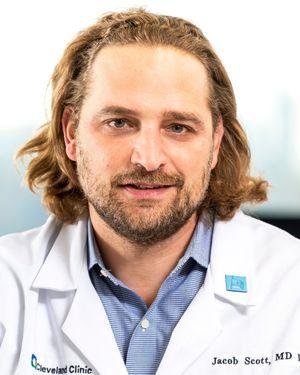Research News
06/07/2024
Evolutionary game theory sheds light on pre-existing treatment resistance
A new study identifies evolutionary dynamics that support pre-existing treatment resistance mutations in lung cancer and beyond.

Pictured above: study first author Jeff Maltas, PhD (red shirt), Jacob Scott, MD, DPhil (second from the left) and other members of the Scott Lab.
A common frustration that physicians and patients face is pre-existing treatment resistance. This occurs when diseases, such as cancer and infections, are not responsive to treatments that they have not previously encountered because of small populations of cells resistant to the drug that exist before treatment even begins.
New research from a team led by Jeff Maltas, PhD, a postdoctoral fellow in the laboratory of Cleveland Clinic's Jacob Scott, MD, DPhil, demystifies how pre-existing treatment resistance develops. The study, published in PRX Life suggests that answers may lie in the way cells interact with each other, like different species in an ecosystem. In these interactions, newly arising resistant mutated tumor cells or bacteria receive help from the non-resistant cells from which they arose. Interactions with the pre-existing population provides a benefit to resistant mutants that would otherwise not be able to survive on their own.
Dr. Maltas says that the findings open the door to new strategies to improve treatment plans for cancer, bacterial infections and other diseases that evolve treatment resistance.
"Our findings offer an attractive new hypothesis for why treatment resistance is so common - ecology," he says. "These results suggest a novel treatment strategy where we can design treatments that disrupt the ecological interaction that allows resistance to gain a foothold in the first place, rather than developing new drugs for increasingly resistant populations as treatment continues."
Dr. Maltas led a team to extend a previous mathematical and experimental framework to examine the impact of these ecological interactions on the evolutionary dynamics of resistance. The researchers illustrated their model by testing communities of drug resistant and drug sensitive non-small-cell lung cancer (NSCLC) cells, a cancer notorious for preexisting resistance to targeted therapies. Each treatment resistant mutant had positive interactions with the drug sensitive ancestor cells they were engineered from, matching the mathematical predictions.
"This is a really exciting finding because it settles some dissonance between classical population genetics and theoretical ecology that has made it difficult to understand and combat treatment resistance in cancer and other diseases," says Dr. Scott.
Featured Experts
News Category
Related News
Research areas
Want To Support Ground-Breaking Research at Cleveland Clinic?
Discover how you can help Cleveland Clinic save lives and continue to lead the transformation of healthcare.
Give to Cleveland Clinic